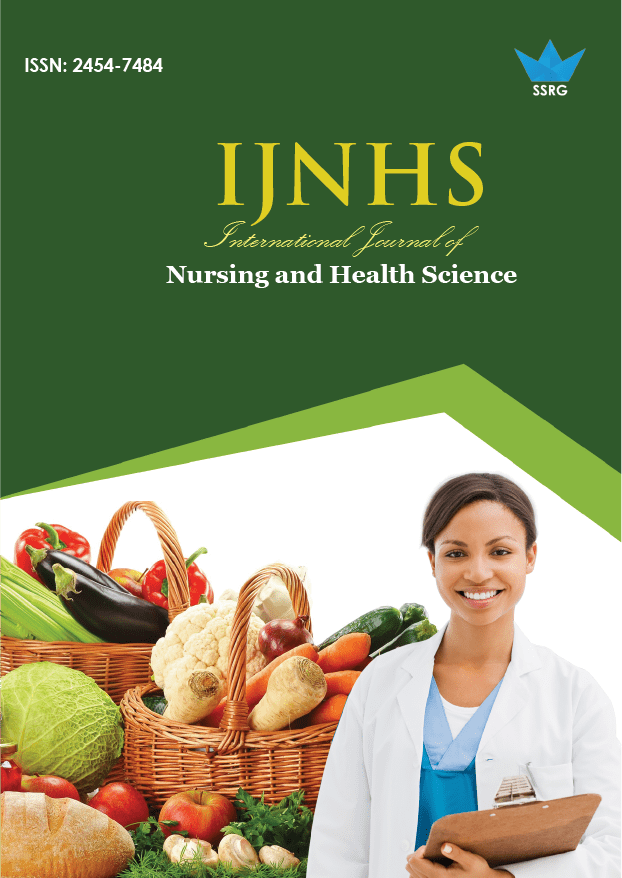Psychological Wellbeing of Police as Frontline Warriors During the Peak of the Covid-19 Pandemic in Gujarat: An Observational Survey Study

| International Journal of Nursing and Health Science |
| © 2023 by SSRG - IJNHS Journal |
| Volume 9 Issue 3 |
| Year of Publication : 2023 |
| Authors : Trivedi Kushagra Bhaskarbhai, Jintu Kurian, Natesh Babu, Guru Deo |
How to Cite?
Trivedi Kushagra Bhaskarbhai, Jintu Kurian, Natesh Babu, Guru Deo, "Psychological Wellbeing of Police as Frontline Warriors During the Peak of the Covid-19 Pandemic in Gujarat: An Observational Survey Study," SSRG International Journal of Nursing and Health Science, vol. 9, no. 3, pp. 9-12, 2023. Crossref, https://doi.org/10.14445/24547484/IJNHS-V9I3P102
Abstract:
The public realized the crucial role of police as frontline warriors in controlling the spread of the pandemic by restricting the movement of the public during the peak of the COVID-19 pandemic. In a way, the dedicated duty deliverance of police, without paying attention to their own self, helped regulate the spread of COVID-19 to a large extent. Naturally, this affected the psychological well-being of the police. In this regard, the present correlational study aimed at understanding the impact of public support, Self-regulated, work environment, family, and spiritual aspects on the psychological well-being of police. A Survey was conducted on adult police personnel (N=100; 35.3±7.7 years) from Dahod, Gujarat, India. Police on fieldwork, age: 20-50 years, both genders and working in the police for more than 5 years, and willing to participate were included. Police engaged in office work, on night shift work and not consenting were excluded. Data was collected using a screening form. Principal component analysis denoted the spiritual factors among the police personnel, irrespective of gender (Male: n=43; 50%; Female: n=7; 50%), resulting in higher psychological well-being (X2= 22.8; p<0.001). Public support was found to be the second most contributing factor (X2= 23.1; p <0.001), although it was better among females (n=8; 57%) than males (n=39; 45%). Summing up, the psychological well-being among police is directly connected to spiritual wellbeing and public support. In addition, self-regulatory measures, family support, and workplace harmony were also found to contribute to the psychological well-being among police during the pandemic's peak.
Keywords:
Frontline warriors, Police, Psychological wellbeing, COVID-19 pandemic.
References:
[1] Behnood Bikdeli et al., “Pharmacological Agents Targeting Thromboinflammation in COVID-19: Review and Implications for Future Research,” Thromb Haemost, vol. 120, no. 07, pp. 1004-1024, 2020.
[CrossRef] [Google Scholar] [Publisher Link]
[2] Robin E Ferner, and Jeffrey K Aronson, “Remdesivir in covid-19,” BMJ, vol. 369, pp. 1-2, 2020.
[CrossRef] [Publisher Link]
[3] Suresh K Pandey, and Vidushi Sharma, “A Tribute to Frontline Corona Warriors-Doctors who Sacrificed their Life while Saving Patients During the Ongoing COVID-19 Pandemic,” Indian J Ophthalmol, vol. 68, no. 5, pp. 939-942, 2020.
[CrossRef] [Google Scholar] [Publisher Link]
[4] A. Katkar, and S. Dakhode, “How COVID-19 Pandemic Impacted General Population, Diagnostic Facilities and Frontline Warriors,” Bioscience Biotechnology Research Communications, vol. 14, no. 6, pp. 225-230, 2021.
[CrossRef] [Google Scholar] [Publisher Link]
[5] F. Landi et al., “Post-COVID-19 Global Health Strategies: the Need for an Interdisciplinary Approach,” Aging Clinical and Experimental Research, vol. 32, no. 8, pp. 1613–1620, 2020.
[CrossRef] [Google Scholar] [Publisher Link]
[6] Aishwarya Jaiswal, Tushar Singh, and Yogesh Kumar Arya, “Psychological Antibodies’ to Safeguard Frontline Healthcare Warriors Mental Health Against COVID-19 Pandemic-Related Psychopathology,” Frontiers in Psychiatry, vol. 11, 2020.
[CrossRef] [Google Scholar] [Publisher Link]
[7] Sharma Atul, and Mohanan Keerthi, “Obstacles Faced by Nurses Working in Covid-19 Unit: A Developing Country View Point,” Asian Journal of Nursing Education and Research, vol. 10, no. 4, pp. 459–462, 2020.
[CrossRef] [Google Scholar] [Publisher Link]
[8] Shwethapriya Rao et al., “Post-COVID-19 Syndrome: The New Pandemic Affecting Healthcare Workers and How the Frontline Warriors are Battling It,” Indian J Palliat Care, vol. 27, no. 2, pp. 313-318, 2021.
[CrossRef] [Google Scholar] [Publisher Link]
[9] Sadia Masood et al., “COVID-19 Pandemic & Skin Care Guidelines for Health Care Professionals,” Pakistan Journal of Medical Sciences, vol. 36, no. COVID19-S4, 2020.
[CrossRef] [Google Scholar] [Publisher Link]
[10] Corrado Lodigiani et al., “Venous and Arterial Thromboembolic Complications in COVID-19 Patients Admitted to an Academic Hospital in Milan, Italy,” Thrombosis Research, vol. 191, pp. 9-14, 2020.
[CrossRef] [Google Scholar] [Publisher Link]
[11] Akiko Iwasaki, “What Reinfections Mean for COVID-19,” The Lancet Infectious Diseases, vol. 21, no. 1, pp. 3-5, 2021.
[CrossRef] [Google Scholar] [Publisher Link]
[12] Pragya Agarwala et al., “Epidemiological Characteristics of the COVID-19 Pandemic During the First and Second Waves in Chhattisgarh, Central India: A Comparative Analysis,” Cureus, vol. 14, no. 4, 2022.
[CrossRef] [Google Scholar] [Publisher Link]
[13] Apinya Koontalay et al., “Healthcare Workers’ Burdens during the COVID-19 Pandemic: A Qualitative Systematic Review,” Journal of Multidisciplinary Healthcare, vol. 14, pp. 3015-3025, 2021.
[CrossRef] [Google Scholar] [Publisher Link]
[14] Ya Adam Jallow, “The Impact of Stress Management within Organizations and Its Effects on Employees’ Performance,” SSRN, pp. 1- 97, 2020.
[CrossRef] [Google Scholar] [Publisher Link]
[15] Catherine Woodyard, “Exploring the Therapeutic Effects of Yoga and its Ability to Increase Quality of Life,” Int J Yoga, vol. 4, no. 2, pp. 49-54, 2011.
[CrossRef] [Google Scholar] [Publisher Link]
[16] Y. K. Bokam et al., “Importance of Pharmacists as a Front Line Warrior in Improving Medication Compliance in Covid-19 Patients,” Indian Journal of Pharmaceutical Science, vol. 83, no. 2, pp. 393-396, 2021.
[CrossRef] [Google Scholar] [Publisher Link]

 10.14445/24547484/IJNHS-V9I3P102
10.14445/24547484/IJNHS-V9I3P102